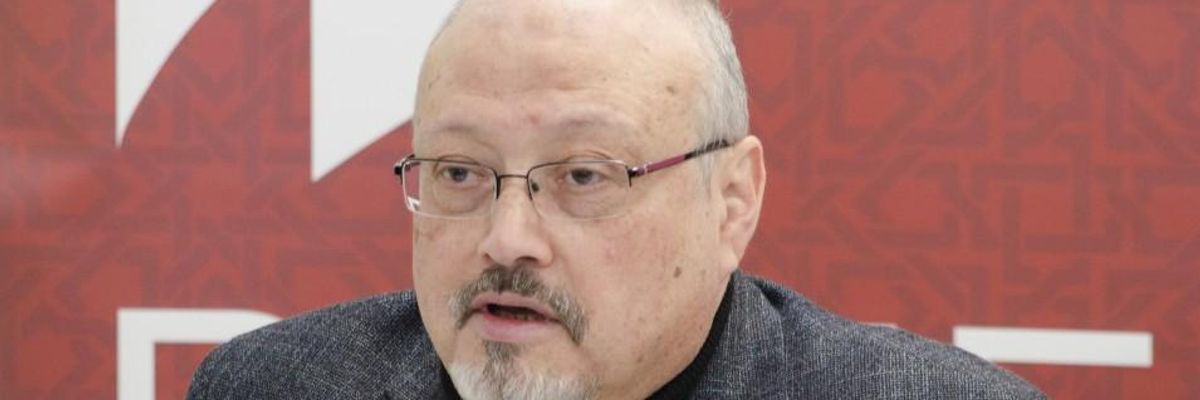Saudi Arabian rights activists joined with advocacy groups to mark the one-year anniversary of journalist Jamal Khashoggi's death Wednesday with actions and calls for accountability.
"Any talk of assuming responsibility for Jamal Khashoggi's killing is meaningless if not met with the immediate and unconditional release of dozens of individuals who continue to languish in prison, and who continue to be at risk of torture and other ill-treatment, solely for having expressed their opinion in a peaceful manner," said Amnesty International's Middle East research director Lynn Maalouf.
Khashoggi was murdered on October 2, 2018 in the Saudi consulate in Turkey. Common Dreams reported Wednesday that an official complaint was filed with the International Criminal Court over the incident.
In the year since the killing, Saudi Arabia has dumped funding into public relations to improve the kingdom's standing in the U.S., according to Open Secrets.
Saudi Arabian interests reported spending just over $16 million on foreign influence operations from October 2, 2017, until October 2, 2018, according to OpenSecrets' analysis. In the year since Khashoggi's death, Saudi interests have poured more than $27 million into influence operations disclosed in Foreign Agent Registration Act filings in OpenSecrets' Foreign Lobby Watch database.
CodePink co-founder Medea Benjamin, in an opinion piece for Common Dreams Tuesday, wrote that those who buy the explanation from Saudi Crown Prince Mohammed bin Salman, who is known as MBS, are complicit in the kingdom's rewriting of the facts of the murder.
"Who is more evil," said Benjamin, "the maniacal Saudi crown prince responsible for Khashoggi's murder and the murder of tens of thousands of Yemenis, or the mendacious world leaders and businesspeople who continue to embrace what should be a pariah state?"
The prince's acknowledgement over the weekend that he bore general responsibility for the murder--a statement that left out any direct admission of responsibility or apology--spurred Human Rights Watch's Middle East director Sarah Leah Whitson to call the comments "insufficient."
"If he's serious, the crown prince and his government should provide transparency into the ongoing trial and reveal everything they know about the planning, execution, and aftermath of Khashoggi's murder," said Whitson. "Instead, Saudi authorities are doubling down on repression and continuing to silence independent Saudi voices that Khashoggi sought to defend."
In a statement, Amnesty said it is supporting the launch of a podcast for Saudi expats fighting for free expression in the kingdom. Saudi scholar Hala al-Dosari said that the podcast "will present a powerful platform for Saudi journalists, scholars, and activists to counter the state-led propaganda and misinformation campaign."
"It will engage the Saudi people in a rare and free discussion on issues such as public participation, rule of law, feminism and other issues related to human rights," said al-Dosari.
There are a number of people in Saudi prisons who need solidarity, Amnesty said:
To date, Amnesty International has documented the cases of at least 30 prisoners of conscience who are behind bars serving prison sentences of between five and 30 years solely for peacefully exercising their rights to freedom of expression, association and peaceful assembly. Amongst those currently detained are Mohammad al-Qahtani, a founding member of the Saudi Civil and Political Rights Association who called for the protection and promotion of human rights and provided legal support to families of detainees, and Waleed Abu al-Khair, a lawyer who defended human rights defenders before his imprisonment. Mohammad al-Qahtani and Waleed Abu al-Khair were tried and sentenced before the counter-terror court to 10 and 15 years in prison, respectively, for their peaceful human rights work.
Critics of President Donald Trump pointed to a pattern of coddling MBS from the White House as a reason that, a year after the murder, next to nothing has been done.
"Despite the backlash directed at the kingdom, the Saudis haven't faced serious consequences for the slaying of Khashoggi or its slaughter of civilians in Yemen," the Center for International Policy's Ben Freeman and William D. Hartung wrote Wednesday. "That is thanks in large part to one man--President Trump. He has loudly and emphatically defended Saudi Arabia at every opportunity."
In a tweet, Sen. Elizabeth Warren (D-Mass.) called for action.
"A year has passed, but Donald Trump and his administration have done nothing to hold Saudi Arabia accountable for the murder of Jamal Khashoggi," said Sen. Elizabeth Warren (D-Mass.). "He and his family deserve justice."




